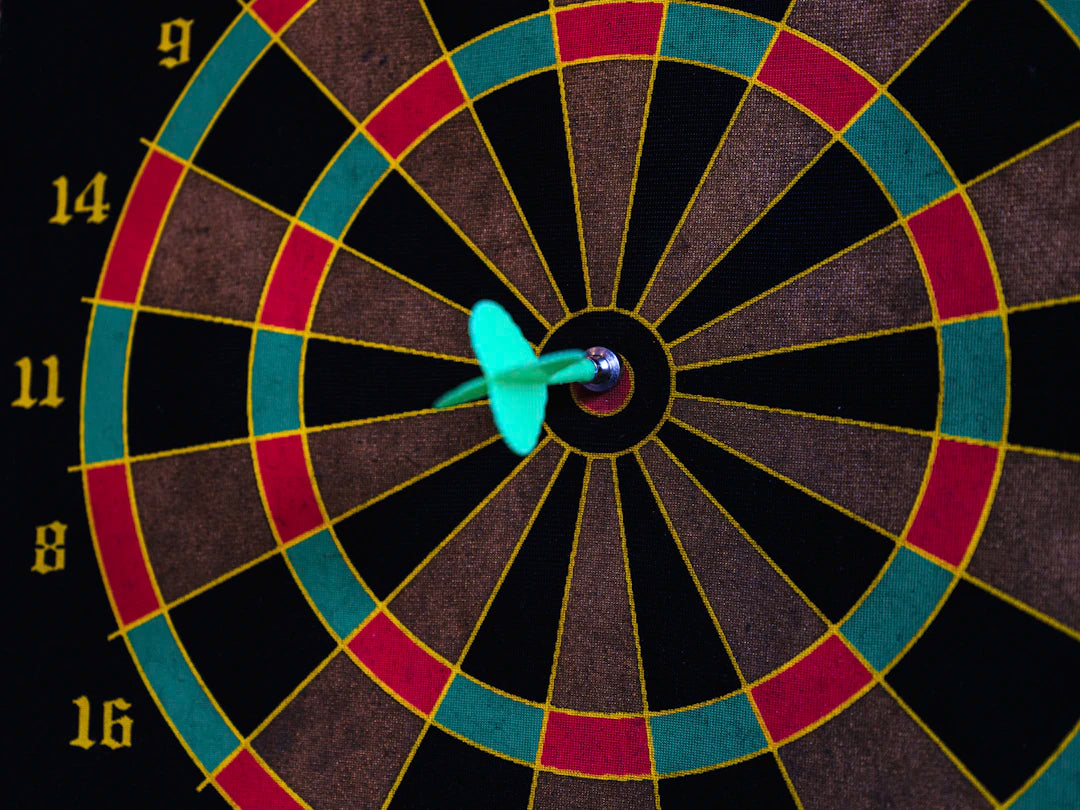Overview
Darts offers a unique blend of competition, social interaction, and personal growth. Players enjoy mastering skills, building connections, and experiencing mental engagement. The game provides therapeutic benefits, including stress relief and the development of patience. As technology evolves, darts continues to attract new players, ensuring its legacy thrives.
Frequently Asked Questions
1. What are the main reasons people enjoy playing darts?
2. How does playing darts help with mental focus?
3. Can playing darts provide therapeutic benefits?
4. What role does social interaction play in the game of darts?
5. How is technology influencing the future of darts?
Darts is a game that transcends generations, bringing people together in a unique blend of skill, competition, and camaraderie. Beyond the thrill of competition or the satisfaction of a perfect bullseye, the psychology surrounding darts is deeply rooted in our love for the game. Understanding this psychology not only enhances our appreciation for darts but also offers insights into why this sport remains so popular. In this article, we’ll explore the mental aspects of playing darts, the social dynamics involved, and the personal benefits of participating in this beloved pastime.
The Core Attraction: Competition and Achievement
At the heart of any sport lies the drive for competition. Darts is no exception. Even in casual settings, players find themselves honing their skills to surpass their friends or family members. This friendly rivalry can ignite excitement and motivation, leading to a cycle of improvement that keeps players coming back for more.
The Challenge of Skill Mastery
The appeal of darts largely stems from its deceptively simple premise. Tossing a small sharp object toward a target may sound easy, but achieving consistent accuracy requires practice and focus. The desire to master the art of throwing provides players with a sense of achievement. Hitting specific scores or achieving a high checkout becomes a personal benchmark. Each game serves as an opportunity for growth, fueling players' motivation to improve.
The Social Aspect: Building Connections
Another compelling reason people love playing darts is the social environment it cultivates. Whether in a bustling pub, a friend's basement, or a competitive league, darts inherently encourages social interaction.
The Community Spirit
The dart community is as diverse as it is welcoming. Individuals from all walks of life come together to share their love for the game. This sense of belonging can be incredibly fulfilling. Many players cherish their local leagues or tournaments as they not only get to compete but also develop friendships that extend beyond the board.
Shared Experiences
- Celebrating Victories: Nothing beats the rush of winning a closely contested game and sharing that joy with friends.
- Learning Together: The art of throwing can be refined with the guidance and encouragement of fellow players, creating a rich learning environment.
- Memorable Moments: From hitting that final double to celebrated game nights, darts form the backdrop of countless cherished memories.
Mental Focus: The Game Within the Game
Playing darts requires not just physical skill but a considerable amount of mental fortitude. The psychological aspect serves as a critical determinant of success in darts. Whether playing casually or competitively, players must develop focus, mindfulness, and strategy. This is where the game's psychological depth becomes particularly interesting.
The Power of Visualization
One effective mental strategy employed by many successful dart players is visualization. Before throwing, players often picture the trajectory of the dart and the moment it hits the target. This mental rehearsal can boost confidence and improve performance. The power of visualization can significantly affect a player’s mindset, leading to a greater sense of control and precision during play.
Emotional Regulation
Another key psychological element of darts is emotional regulation. As players face the pressure of competition, maintaining composure becomes essential. Managing anxiety or frustration can vastly improve a player’s focus and overall gameplay. Techniques such as deep breathing and positive self-talk are often utilized, fostering a calm and strategic approach to every throw.
The Thrill of Competition: High Stakes, High Rewards
The competitive nature of darts can be both exhilarating and daunting. For many, the thrill of competition is addicting, offering an adrenaline rush unlike any other. The structure of competitions, from casual games to intense tournaments, provides players with various environments to challenge themselves.
Pushing Your Limits
Whether playing against a tough opponent or merely striving for a personal best, the challenge can be incredibly motivating. The desire to push personal limits adds an exciting layer to the game. Setting goals, tracking progress, and overcoming obstacles drives players to engage more deeply with the sport.
The Joy of Redemption
In darts, every throw is a new opportunity. A missed bullseye in one game can lead to a spectacular finish in the next. This element of redemption draws players in, as they crave the satisfaction that comes with improvement. The belief that every game is a fresh start energizes players, encouraging continuous engagement.
The Therapeutic Benefits of Darts
Beyond competition and social interaction, darts also offer a range of therapeutic benefits. The act of playing can have significant positive impacts on mental health and overall well-being.
Stress Relief
Playing darts can serve as an excellent stress reliever. The focused nature of the game provides a distraction from everyday worries. Engaging in a spirited match with friends can evoke laughter and joy, lifting spirits and reducing stress.
Developing Patience and Discipline
The process of learning and mastering darts fosters patience and discipline. Players must invest time in practice and self-improvement, and the journey can be incredibly rewarding. This dedication translates beyond the dartboard, promoting resilience and commitment in various aspects of life.
Engaging the Mind and Body
Darts not only challenges the mind but also promotes physical engagement. While it may seem like a simple throwing game, players rely on muscle memory and hand-eye coordination to improve their accuracy. This physical aspect creates an engaging experience that keeps players hooked.
The Coordination Challenge
With every throw, players refine their coordination and motor skills. Consistent practice strengthens these abilities, making the game increasingly fulfilling. Successfully marking a high score can feel like a well-earned physical achievement, combining mental focus with physical execution.
Mental Math and Strategy
Calculating scores and strategizing moves during gameplay enhances cognitive functions, such as problem-solving and critical thinking. As players assess the best shot to take and adapt to their opponents' plays, they actively engage their minds in a stimulating way.
The Language of Darts: Humor and Banter
Another intriguing aspect of darts culture is its unique sense of humor. Banter among players often lightens the atmosphere, transforming competitive encounters into enjoyable social events. This vibrant exchange of friendly jibes not only entertains but also strengthens camaraderie among players.
The Art of Banter
Witty quips and playful taunts elevate the energy of a game, creating a lively and entertaining environment. Many players find that this humorous dynamic enriches their experience, fostering a spirit of fun and connection that keeps them returning.
A Culture of Celebration
Much of the allure surrounding darts lies in its ability to bring people together. Celebrating not just wins, but also small successes and progress fosters an environment of encouragement and enthusiasm, enhancing the social experience.
The Future of Darts: Continuing the Legacy
The continued popularity of darts suggests that its psychological and social benefits resonate with players worldwide. As new generations are introduced to the game, the rich culture of competition, camaraderie, and mental engagement will persist. Many are discovering that darts are not just a game, but a profound experience that deepens connections among players and enhances personal growth.
The Role of Technology
With advancements in technology, the future of darts looks bright. Online communities, virtual competitions, and smart scoring systems are revolutionizing how people interact with the game. These innovations will likely draw even more individuals into the fold, ensuring that darts remain a vibrant part of social culture.
Continued Growth
As interest in darts grows, so does the opportunity to further explore its psychological aspects. Research into the mental strategies employed by successful players can benefit newcomers and seasoned veterans alike. By sharing insights and fostering discussions about the game's psychological components, the community can continue to thrive.
So why do we love playing darts? The answer lies in its multifaceted nature, weaving together competition, socialization, psychological engagement, and personal growth. The thrill of competition, the camaraderie of fellow players, and the therapy of focusing on the game all combine to create a rich and fulfilling experience. Whether you play for fun, strive for mastery, or savor the social aspects, one thing is certain: darts have a unique way of captivating our hearts and minds. Join the movement, and discover the joy of playing darts—after all, every throw is an opportunity waiting to be seized!



